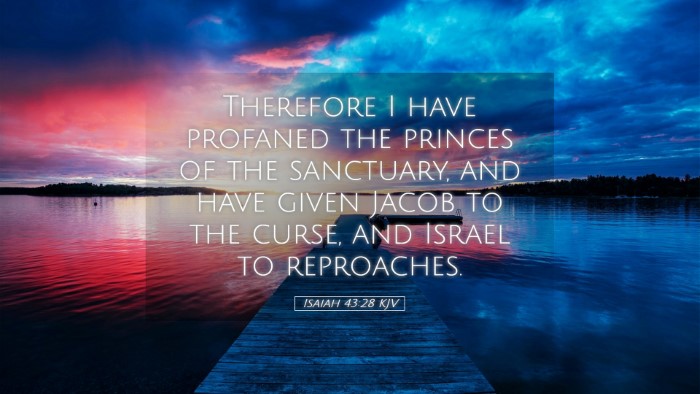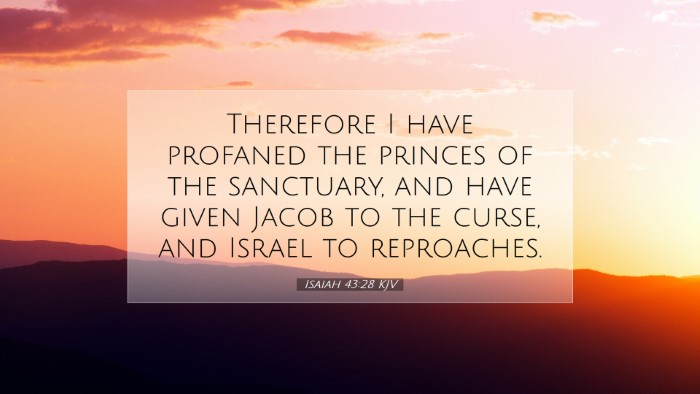Isaiah 43:28 Commentary
Verse: "Therefore I have profaned the princes of the sanctuary, and have given Jacob to the curse, and Israel to reproaches."
Introduction
The verse from Isaiah 43:28 marks a significant moment in the prophet Isaiah’s discourse. It speaks of judgment and consequences for the people of Israel, reflecting the themes of divine rebuke and the consequences of straying from righteousness. The insights presented in this analysis combine the wisdom found in public domain commentaries including those of Matthew Henry, Albert Barnes, and Adam Clarke.
Contextual Analysis
Understanding the context surrounding Isaiah 43:28 is crucial. In this chapter, Isaiah reassures Israel of God's sustaining presence and redemptive purpose. However, this particular verse shifts to address their failures and the consequences they have incurred due to their unfaithfulness.
1. Historical Context
Isaiah prophesied during a time when Israel faced profound challenges, including political turmoil and threats from surrounding nations. The leaders, who are referred to as 'princes of the sanctuary', had a sacred responsibility to lead Israel in faithfulness to God. Their failures in this role lead to divine judgment.
2. Theological Themes
- Judgment: The verse underscores the theme of divine judgment, indicating that God will not overlook the sins of His people.
- Covenant Relationship: The relationship between God and Israel is covenantal, meaning that disobedience comes with grave consequences. The mention of 'the curse' emphasizes the severe repercussions of breaking God's laws.
- Reproach: The reference to Israel being given to reproaches indicates the national humiliation and spiritual degradation resulting from their unfaithfulness.
Commentary Insights
Matthew Henry’s Commentary
Matthew Henry articulates that this verse serves as a profound reflection on the seriousness of forsaking the instructions of God. He notes that the 'princes' signify not only the leaders of Israel but also anyone in a position of authority within the community of faith.
Henry writes that when God 'profanes' His princes, it implies that He has found them unworthy of the honor and strength endowed upon them. They have been disgraced because they neglected their duties, leading the people astray.
Albert Barnes’ Notes
Albert Barnes highlights that God’s giving Jacob and Israel to 'the curse' speaks to the individual accountability and corporate responsibility of the nation. He implies that God's judgment is both a historical reality and a theological principle that persists throughout scripture. Barnes argues that it serves as a reminder of the serious implications of sin, especially for God’s chosen people.
Barnes also points out that this judgment is not devoid of hope. Throughout Isaiah, there are promises of restoration, indicating that despite the depth of judgment, God's plan includes redemption for those who return to Him.
Adam Clarke’s Commentary
Adam Clarke provides a detailed examination of the Hebrew terms used in the text. He emphasizes the significance of the word 'profane', which denotes a setting aside of that which is sacred. Clarke suggests that this act of profaning must be understood as a divine interrogation of the leaders’ roles and their failure to uphold their offices faithfully.
Clarke makes a poignant observation regarding the duality of God’s character as both just and merciful. While God must execute judgment for transgressions, He remains committed to His covenant and ultimately desires reconciliation with His people.
Practical Applications
The lessons from Isaiah 43:28 can be implemented in the lives of pastors, students, and theologians as they navigate their journeys of faith. Here are some practical applications drawn from the commentary insights:
- Integrity in Leadership: Leaders in faith communities should consider the weighty responsibility they carry. The failures of the princes highlight the necessity of integrity and faithfulness in leading God’s people.
- Awareness of Judgment: Acknowledging the reality of divine judgment can encourage humility and a more profound reliance on God’s grace. It is a call to repentance and spiritual renewal.
- Hope in Restoration: Even amidst judgment, Isaiah offers a message of hope. Pastors and theologians can focus on the balance between justice and mercy, emphasizing that repentance can lead to restoration.
Conclusion
Isaiah 43:28 serves as a sobering reminder of God's holiness, the serious nature of sin, and the invaluable role of leaders within the faith community. This analysis, synthesizing insights from influential commentaries, aims to deepen understanding and promote thoughtful reflection on the implications of faithfulness to God. As Israel grappled with the consequences of their actions, they were ultimately called back to the mercy and restoration available through prayer and repentance.


